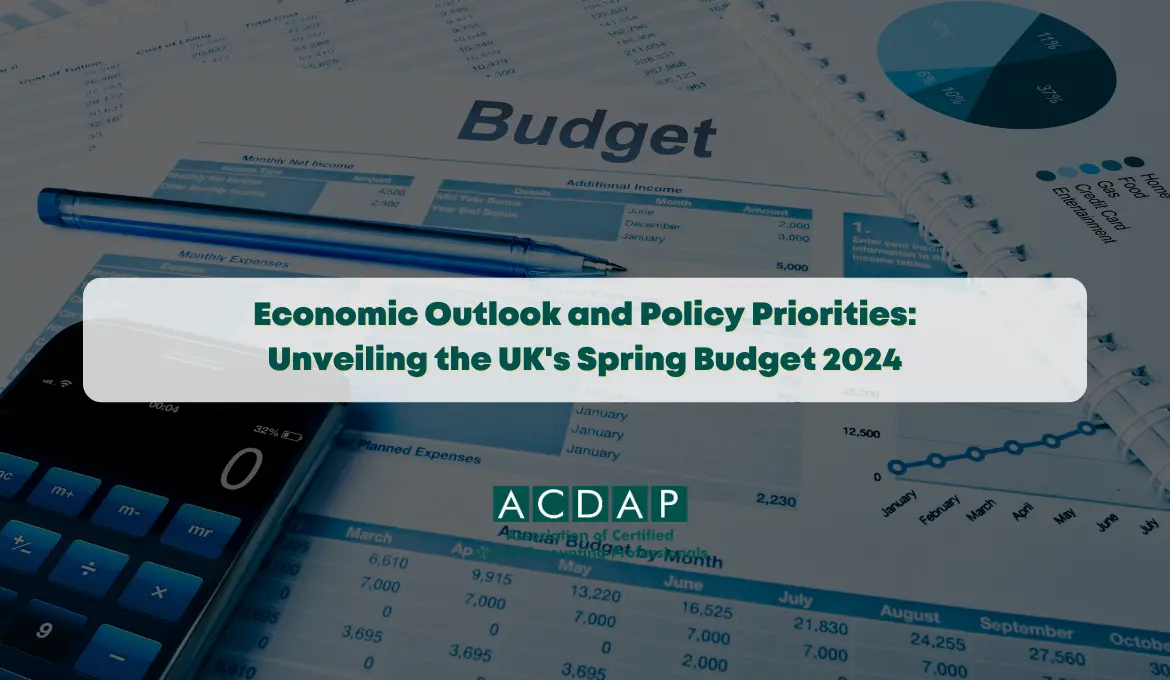Amidst the intricate landscape of post-pandemic recovery and global economic shifts, the Spring Budget 2024 emerges as a pivotal event. The Chancellor's announcements, set against a backdrop of evolving economic conditions and policy imperatives, illuminate the government's fiscal strategy, priorities, and measures to guide the nation towards sustainable growth and prosperity.
This in-depth analysis probes into the economic outlook, key policy priorities, and the ramifications of the UK's Spring Budget 2024, underscoring its significance in the current economic climate.
Recovery, Challenges, and Opportunities
Despite the tumultuous disruptions caused by the COVID-19 pandemic, the UK economy has demonstrated remarkable resilience. GDP has rebounded and employment levels are gradually improving, signalling a strong recovery momentum.
However, challenges such as inflationary pressures, supply chain disruptions, and geopolitical uncertainties remain, underscoring the need for continued vigilance.
Amidst the challenges, the Spring Budget assumes a pivotal role in articulating the government's vision of economic resilience and prosperity. Striking a balance between short-term stabilisation efforts and long-term structural reforms, the Chancellor's announcements are poised to steer the trajectory of the UK economy in the years to come, making it a key focus of this analysis.
Navigating Towards Sustainable Growth
Against economic uncertainty, the Spring Budget of 2024 unveils a set of policy priorities to foster sustainable growth, enhance competitiveness, and address societal challenges. Key areas of focus include:
- Investment in Infrastructure: The Budget allocates significant resources towards infrastructure development, including transportation, energy, and digital connectivity. Investments in critical infrastructure create jobs, stimulate economic activity, and lay the foundation for long-term productivity gains and enhanced global competitiveness.
- Skills and Education: Recognising the importance of human capital in driving innovation and productivity, the Budget prioritises investments in skills development, vocational training, and education. The government aims to enhance productivity, reduce unemployment, and promote social mobility by equipping the workforce with the necessary skills for the digital age.
- Climate Action and Sustainability: With growing concerns over climate change and environmental degradation, the Budget emphasises transitioning to a low-carbon economy and adopting sustainable practices across sectors. Measures such as green investments, carbon pricing mechanisms, and incentives for renewable energy aim to mitigate climate risks while unlocking opportunities for green growth and job creation.
- Support for Small Businesses and Innovation: Recognising the importance of small and medium-sized enterprises (SMEs) for economic growth and innovation, the Budget introduces measures to support SMEs, including tax incentives, access to finance, and regulatory reforms. By fostering a landscape conducive to entrepreneurship and innovation, the government seeks to drive economic dynamism and resilience.
Fiscal Framework and Budgetary Measures
The Spring Budget outlines the government's fiscal framework and budgetary measures to achieve fiscal sustainability while supporting economic recovery and resilience.
- Commitment to fiscal prudence: The Spring Budget reiterates the government's unwavering commitment to fiscal prudence and responsible stewardship of public finances. Measures to contain expenditure growth, enhance revenue mobilisation, and reduce the budget deficit underscore a long-term focus on fiscal sustainability, providing a sense of security in these uncertain times.
- Taxation and Revenue Measures: The Budget introduces targeted tax reforms and revenue-raising measures to ensure a fair and efficient tax system. While maintaining the overall tax burden at sustainable levels, the government seeks to enhance tax compliance, close loopholes, and promote investment incentives.
- Public Investment: Recognising the role of public investment in driving economic growth and social development, the Budget allocates resources towards priority areas such as healthcare, education, and innovation. Strategic investments aim to address infrastructure gaps, enhance public services, and promote inclusive growth.
- Debt Management: With public debt levels remaining elevated, the Budget outlines a strategy for prudent debt management and reduction over the medium term. Measures to refinance debt at favourable terms, extend maturities, and improve debt sustainability aim to mitigate fiscal risks and safeguard macroeconomic stability.
Implications and Challenges Ahead
The Spring Budget 2024 announcements carry significant implications for a wide range of stakeholders, including businesses, households, investors, and policymakers.
While the Budget signals a commitment to economic recovery, sustainability, and resilience, it also presents several challenges and uncertainties that need to be navigated. It explains these implications and challenges, providing a comprehensive understanding of the Spring Budget's impact.
- Inflationary Pressures: Rising inflationary pressures pose risks to consumer purchasing power, business costs, and macroeconomic stability. The government's response to inflation dynamics, including monetary policy adjustments and targeted interventions, will be critical in managing inflationary risks while supporting economic growth.
- Global Uncertainties: Global factors such as trade tensions, geopolitical risks, and evolving economic trends influence the UK's financial outlook. Uncertainties surrounding Brexit negotiations, international trade agreements, and geopolitical developments could impact the UK's growth prospects and policy environment.
The Budget acknowledges the persistent Challenge of social and economic inequality, which has been further exacerbated by the pandemic and structural barriers to opportunity. The government's measures to promote inclusive growth, reduce poverty, and enhance social mobility are a clear indication of its commitment to building a more equitable and resilient society, fostering a sense of fairness among the audience.
Conclusion
The UK's Spring Budget 2024 reflects a nuanced approach to navigating economic challenges, seizing opportunities, and advancing policy priorities to foster sustainable growth and prosperity. As the government implements budgetary measures and policy reforms, close monitoring of economic indicators, stakeholder engagement, and adaptive policymaking will be essential in achieving the shared goal of a resilient and inclusive economy.


























